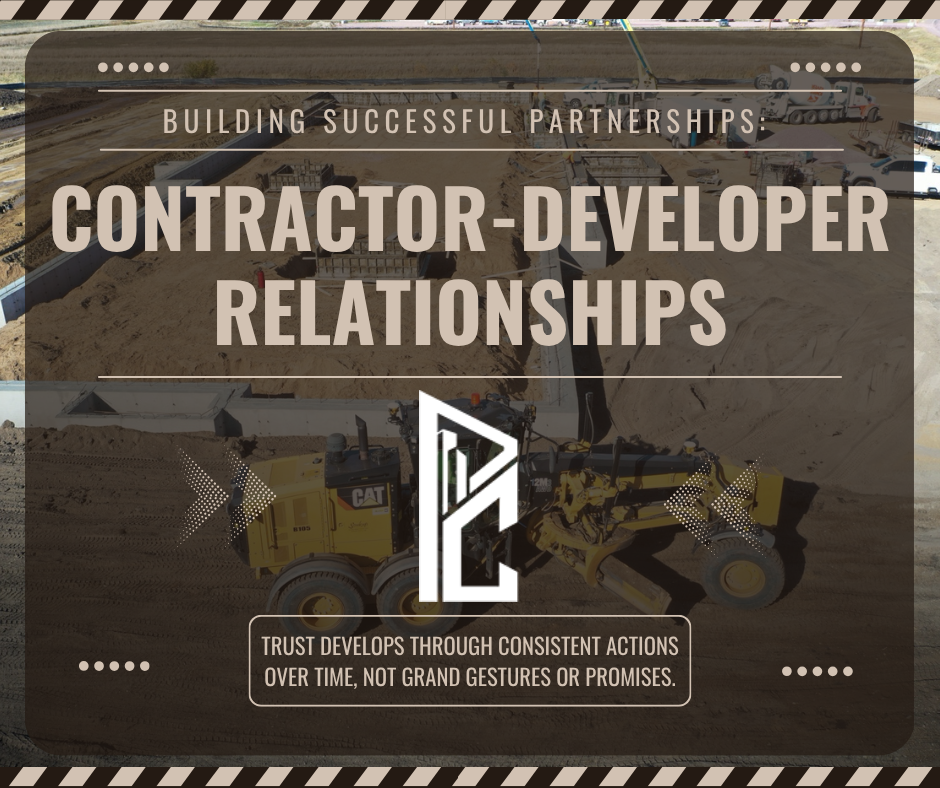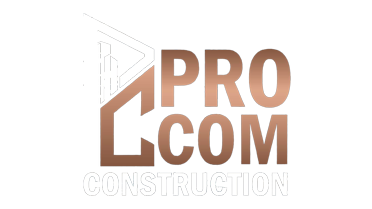
Building Successful Partnerships: What Great Contractor-Developer Relationships Look Like
Commercial construction projects succeed or struggle based on one critical factor that has nothing to do with materials, equipment, or schedules: the relationship between contractor and developer.
We’ve seen it repeatedly over decades of commercial construction nationwide. Projects with strong contractor-developer partnerships navigate challenges smoothly, stay on schedule, and deliver results that exceed expectations. Projects lacking that partnership foundation struggle with every obstacle, no matter how skilled the individual teams might be.
At Pro Commercial, we believe that when quality relationships are formed, the best projects are produced. That’s not just a philosophy…it’s what we’ve witnessed across hundreds of projects in hospitality, senior care, retail, and commercial construction.
Here’s what successful contractor-developer partnerships actually look like in practice.
Communication That Goes Beyond Updates
Good partnerships don’t just exchange information, they create genuine dialogue where both parties feel heard and understood.
Proactive Information Sharing
Strong contractor-developer relationships involve sharing information before it becomes urgent. Contractors who wait until problems demand attention create stress and limit options. The best partnerships include regular communication about project status, potential challenges on the horizon, and opportunities for improvement.
Developers in successful partnerships receive updates that provide real insight, not just surface-level status reports. They understand what’s happening on-site, why decisions matter, and how various factors affect timelines and outcomes. Industry organizations like the Associated General Contractors of America provide resources on construction communication best practices and project management standards.
Honest Conversations
The strongest partnerships make room for honest conversations, even when the news isn’t what anyone wants to hear. Contractors who sugarcoat problems or avoid difficult discussions ultimately damage trust and create bigger issues down the road.
Developers who work well with contractors create environments where honesty is valued over optimism. They want to know about challenges early enough to address them effectively, not discover problems when options have disappeared.
Mutual Respect for Expertise
Successful partnerships recognize that both contractors and developers bring valuable expertise to projects.
Contractors Who Listen
Great contractor-developer relationships involve contractors who genuinely listen to developer vision, priorities, and concerns. Developers know their business models, market positioning, and operational requirements better than anyone. Contractors who dismiss or ignore this knowledge miss critical context that affects project success. Understanding what questions to ask and what expertise to look for starts during the contractor selection process—learn more about vetting commercial contractors effectively.
The best contractors ask questions, seek to understand developer goals beyond just building specifications, and incorporate that understanding into how they approach projects.
Developers Who Value Construction Expertise
Strong partnerships also require developers who respect construction expertise. Contractors understand building systems, construction sequencing, material performance, and practical realities that affect project execution.
Developers in successful partnerships trust contractor input on constructability, scheduling realities, and technical decisions. They recognize that contractor experience provides value beyond just executing plans someone else created.
Aligned Expectations From the Start
Many contractor-developer relationships struggle because expectations were never truly aligned at the project outset. Project management resources from organizations like the Construction Management Association of America emphasize the importance of establishing clear expectations early in the construction process.
Realistic Timeline Discussions
Successful partnerships begin with honest conversations about realistic timelines. Contractors who promise aggressive schedules to win projects set up everyone for disappointment. Developers who demand impossible timelines create pressure that leads to quality compromises or budget overruns.
The best relationships establish timelines based on actual project requirements, realistic construction sequences, and honest assessment of potential challenges—not wishful thinking or competitive pressure.
Budget Transparency
Strong partnerships involve transparent budget discussions from the beginning. Contractors should clearly explain what’s included in pricing, where potential cost variations might occur, and how change orders will be handled.
Developers in good partnerships share their budget realities openly, allowing contractors to provide value engineering suggestions and identify priorities if budget constraints require trade-offs.
Collaborative Problem-Solving
Every construction project encounters unexpected challenges. Partnership quality shows most clearly in how contractors and developers handle these moments together.
Shared Ownership of Solutions
In partnerships, problems become shared challenges rather than opportunities to assign blame. When unexpected site conditions emerge, when material deliveries face delays, when design details need adjustment—successful contractor-developer teams focus on solutions rather than fault-finding. Some projects, like occupied space construction, require especially close collaboration to balance construction progress with ongoing operations.
This doesn’t mean contractors avoid accountability for their responsibilities. It means both parties approach challenges as partners working toward the same goal rather than adversaries protecting their interests.
Creative Thinking
The best contractor-developer relationships generate creative solutions that neither party would have developed alone. Contractors bring construction knowledge and practical experience. Developers bring business understanding and operational insight. Together, they often find approaches that satisfy both construction realities and business requirements.
Trust Built Through Consistency
Trust develops through consistent actions over time, not grand gestures or promises.
Following Through on Commitments
These partnerships involve contractors who consistently deliver on commitments, not just major milestones, but daily promises about communication, scheduling, and responsiveness. When contractors say they’ll provide information by a certain date, follow up on a question, or address a concern, they do it.
Developers in successful partnerships also honor their commitments—providing timely decisions, maintaining agreed-upon payment schedules, and being available when contractor input is needed.
Reliability During Challenges
Trust deepens when both parties prove reliable during difficult moments. Contractors who remain engaged and solution-focused when problems arise build confidence. Developers who support contractors through unexpected challenges rather than immediately threatening or blaming create partnerships that weather storms.
Long-Term Thinking
The strongest contractor-developer relationships extend beyond single projects.
Investment in the Relationship
Contractors who view developers as long-term partners make different decisions than those focused solely on immediate project margins. They invest time in understanding developer business models, provide insights that help with future planning, and prioritize relationship health alongside project outcomes.
Developers who see contractors as potential long-term partners treat them accordingly—fairly negotiating contracts, respecting contractor expertise, and considering how current project experiences might lead to future collaboration.
Learning Together
Great partnerships involve both parties learning from each project. What worked well? What could improve? How can we be more effective next time? Contractors and developers who engage in this reflection build increasingly effective partnerships over time.
Flexibility Within Structure
Successful relationships balance structure with flexibility appropriately.
Clear Processes
Strong partnerships establish clear processes for decision-making, change orders, communication, and problem resolution. Everyone knows how things work, what to expect, and how to address issues when they arise.
Reasonable Adaptability
Within those structures, the best relationships maintain reasonable flexibility. Construction doesn’t always follow neat plans. Successful partnerships adapt to realities while maintaining overall project integrity and goals.
Shared Success Mentality
The most successful contractor-developer relationships operate from a shared success mentality rather than zero-sum thinking.
Win-Win Approaches
Strong partnerships look for solutions where both parties benefit rather than one party maximizing advantage at the other’s expense. Contractors consider developer business success, not just project completion. Developers consider contractor operational realities, not just their own bottom line.
This doesn’t mean either party abandons their interests—it means they recognize that mutual success creates better outcomes than adversarial approaches.
What This Looks Like in Practice
Successful contractor-developer partnerships show up in tangible ways throughout projects:
Projects stay on schedule because communication prevents small issues from becoming major delays. Budgets remain stable because transparent discussions address cost factors proactively. Quality stays high because both parties are invested in outcomes. Problems get solved efficiently because trust enables quick, collaborative decision-making.
Perhaps most importantly, successful partnerships make the construction process less stressful and more productive for everyone involved. Building major commercial projects involves inherent complexity and challenge—strong partnerships make navigating that complexity manageable rather than overwhelming.
Building Partnerships That Last
Great contractor-developer relationships don’t happen by accident. They develop through intentional communication, mutual respect, aligned expectations, collaborative problem-solving, consistent follow-through, and shared commitment to success.
For developers planning commercial projects, the contractor you choose matters less for their equipment or crew size than for their approach to partnership. The best projects emerge from relationships built on trust, communication, and genuine collaboration.
Let’s Build Something Great Together
At Pro Commercial, we approach every project as an opportunity to build lasting partnerships based on trust, transparency, and shared success. Quality relationships produce the best projects—it’s what we’ve seen time and again over forty years of commercial construction.
Ready to start a conversation about your project?

